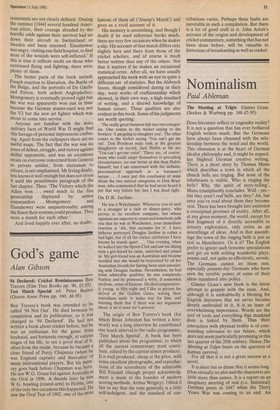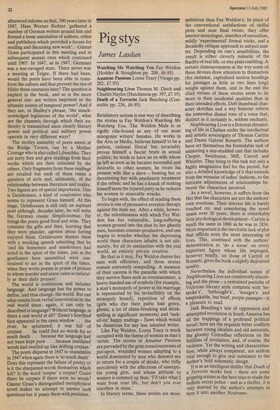Nominalism
Paul Ableman
The Meeting at Telgte Giinter Grass (Seeker & Warburg pp. 160,5.95) Does literature reflect or engender reality? It is not a question that has ever bothered English writers much. But the Germans have always been obsessed with the relationship between the word and the world. This obsession is at the heart of German idealist philosophy and, it might be argued, has blighted German creative writing. There is a short story by Thomas Mann which describes a town in which all the church bells are ringing. But none of the inhabitants is visible. Who is ringing the bells? Why 'the spirit of story-telling', Mann triumphantly concludes. Well — yes — but they aren't real bells, are they? Ah, but once you've read about them they become real. There has been brought into existence a conceptual province of reality. After all, at any given moment, the world, except for that fragment of it directly accessible to sensory exploration, only exists as an assemblage of ideas. And in that assemblage the town of the ringing bells is just as real as Manchester. Or is it? The English prefer to ignore such tiresome speculations and get on with writing wonderful plays, poems and, not quite so effectively, novels. The Germans cannot let them rest, especially present-day Germans who have seen the terrible power of some of their ideas translated into policy.
Giinter Grass's new book is the latest attempt to grapple with the issue. And, although it is undoubtedly a blessing for English literature that we never became deeply embroiled in it, it is an issue of overwhelming importance. Words are the tool of tools and everything that mankind does is linked by them. Thus their interaction with physical reality is of commanding relevance to our future, which does not seem particularly promising in this last quarter of the 20th century. Hence The Meeting at Telgte bears on the question of human survival.
For all that it is not a great success as a novel.
It is short but so dense that it seems long. Rims virtually no plot and the characters are little more than names. It is a report on an imaginary meeting of real (i.e. historical) German poets in 1647 when the Thirty Years War was coming to an end. An afterword informs us that, 300 years later in 1947, Hans Werner Richter 'gathered a number of German writers around him and formed a loose association of authors, critics and publishers which provided a forum for reading and discussing new work'.1 Gunter Grass participated in this meeting and in subsequent annual ones which continued until 1967. In 1647, as in 1947, Germany was a war-ravaged state. There never was a meeting at Telgte. If there had been, would the poets have been able to transform the culture and thus prevent the rise of Hitler three centuries later? The question is implicit in the book, and so is the more general one: are writers impotent or the ultimate source of temporal power? And if they are, in Shelley's phrase, 'the unacknowledged legislators of the world', what are the channels through which their authority is transmitted since clearly literary power and political and military power operate in very different ways?
The motley assembly of poets meets at the Bridge Tavern, run by a Mother Courage who is also called Libuschka. They eat sorry fare and give readings from their works which are then criticised by the others. Only fragments from these readings are retailed but each of them raises a question of style and, ultimately, of the relationship between literature and reality. Two figures are of special importance. One is Gelnhousen, a kind of condottiere who seems to represent Grass himself. At this stage, Gelnhousen is still only an aspirant poet although, decades later, he will write the German classic Simplicissimus. He brings the poets good food and wine. They consume the gifts and then, learning that they were plunder, agonise about having enjoyed them. Gelnhousen shames them with a mocking speech admitting that he 'and his horsemen and musketeers had acted in the spirit of the times, just as the gentlemen here assembled were constrained to act in the spirit of the times, when they wrote poems in praise of princes to whom murder and arson came as naturally as their daily prayers'. The world is continuous and includes language. And language has the power to define, and thus change, the world. But can what results from verbal intervention be the real world since, again, it can only be described in language? Without language, is there a real world at all? `Zesen's horrified face appeared in the open window . . . the river, he spluttered; it was full of corpses. . . he could find no words for so much death . . . because the language had not been kept pure . . . because mutilated words had swelled up like drifting corpses.'
The poets disperse in 1647 to reassemble in 1947 when again there is 'so much death'. Does this represent the failure of poetry or is it the sharpened words themselves which kill? Is the word 'corpse' a corpse? Could there be corpses if there were no words? Giinter Grass's distinguished metaphysical novel makes no attempt to answer such questions but it poses them with precision.



































 Previous page
Previous page